Heart and vascular specialists in Las Vegas
From heart attack care and ER services to cardiac surgery and rehab, the specialists at MountainView Hospital provide the full range of heart care diagnostics and treatment to get you back to living a normal, healthy life.
MountainView has earned numerous awards for its quality heart care, including recognition from Healthgrades as America’s 100 Best Hospitals for Cardiac Care™ for 2 years in a row (’23 -’24).
For information about our cardiac care services, please call us at (702) 962-5021.
Recognition

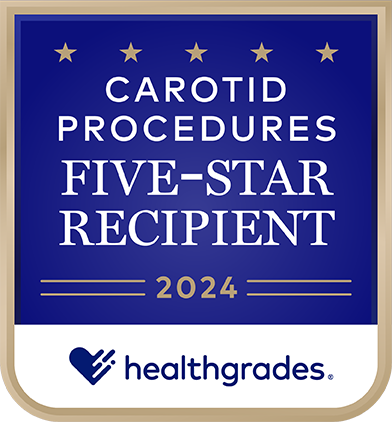
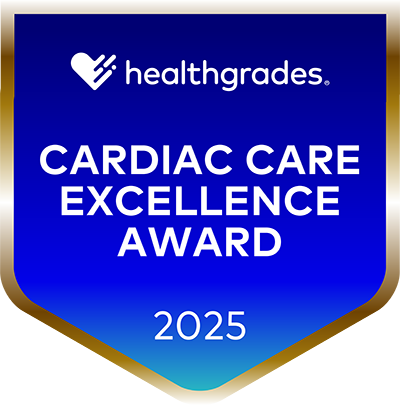
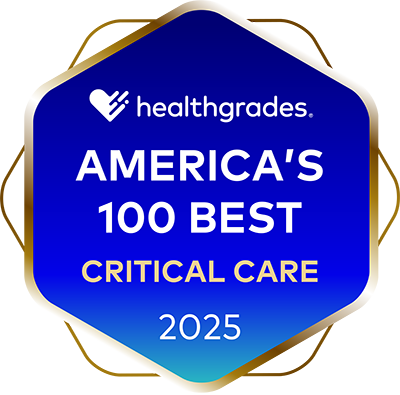

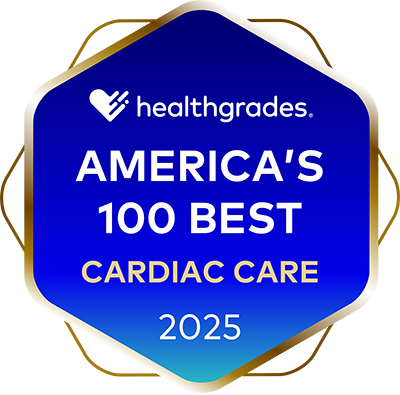
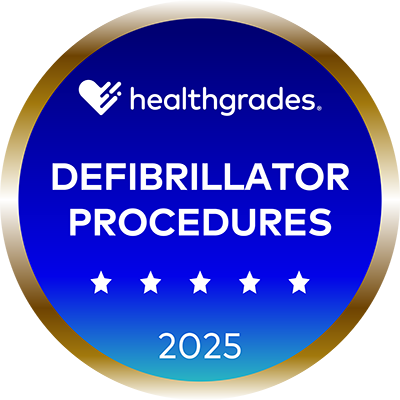
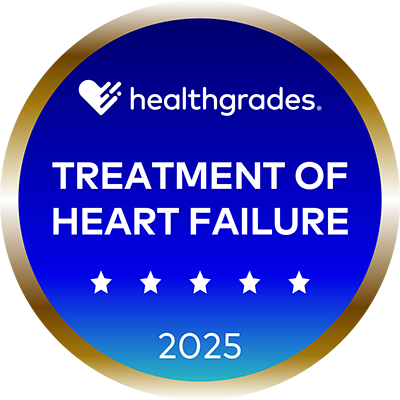
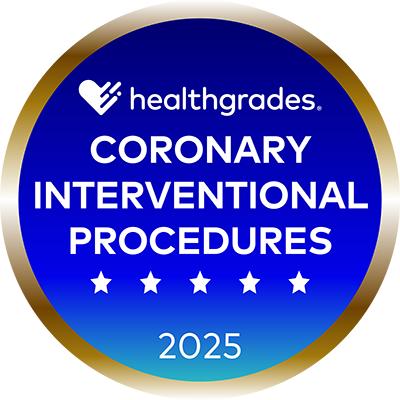
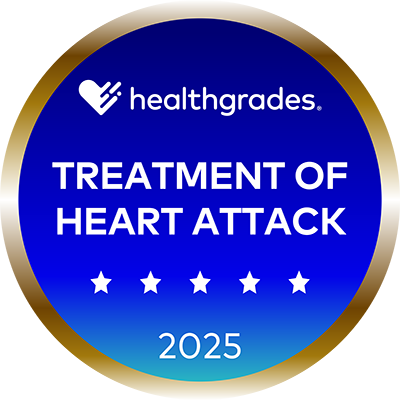
The Joint Commission has certified MountainView Hospital as a Chest Pain Center for sustaining greater levels of care for patients during a heart attack or cardiac arrest.
- Recipient of the Healthgrades Cardiac Care Excellence Award™ for 3 Years in a Row (2023-2025)
- Named Among the Top 5% in the Nation for Cardiology Services in 2025
- Named Among the Top 10% in the Nation for Overall Cardiac Services for 3 Years in a Row (2023-2025)
- Named Among the Top 10% in the Nation for Cardiology Services for 3 Years in a Row (2023-2025)
- Five-Star Recipient for Coronary Interventional Procedures for 2 Years in a Row (2024-2025)
- Five-Star Recipient for Treatment of Heart Attack for 3 Years in a Row (2023-2025)
- Five-Star Recipient for Treatment of Heart Failure for 5 Years in a Row (2021-2025)
- Five-Star Recipient for Defibrillator Procedures for 2 Years in a Row (2024-2025)
Cardiovascular conditions we treat
We treat a variety of cardiovascular conditions, including:
Heart arrhythmia
A heart arrhythmia is a condition in which the heart beats too fast, too slowly or irregularly. Some arrhythmias aren't serious, but others are signs of a more advanced problem.
Our electrophysiologists are trained and experienced in diagnosing and treating arrhythmias, using the latest technology to address the problem and get the heart beating correctly again.
Heart attack
A heart attack occurs when the flow of blood to the heart is blocked. The blockage is caused by a buildup of plaque in the arteries leading to the heart.
Heart attacks are severe and can be fatal. However, new technology and advances in medicine make cardiac treatment and recovery more likely. But time is critical in treatment.
Symptoms of a heart attack include:
- Pain, tightness or a squeezing sensation in your chest that may radiate to your arms, back or neck
- Cold sweat
- Fatigue
- Lightheadedness or dizziness
- Nausea, indigestion or heartburn
- Shortness of breath
Call 911 if you or someone you know might be having a heart attack.
Heart failure
Heart failure is a chronic condition that, in most cases, can't be cured. It occurs when your heart can't pump blood as well as it should. Conditions such as coronary artery disease and high blood pressure may make your heart too weak to pump blood throughout the body.
Our clinic includes physicians, nurses, registered dieticians and physical therapists to help you in congestive heart failure treatment. We can help you with cardiac education, increase your awareness of signs and symptoms of heart failure, reduce sodium and record your weight daily, incorporate exercises and activities into your routine and improve your quality of life.
Valve disease
Valve disease occurs when one of the valves of the heart doesn't work correctly. This condition may occur at birth, but it may also develop due to heart disease.
The heart specialists at MountainView treat many different valve problems using minimally invasive surgery. In doing so, your recovery time is shorter, and you can get back to doing the things you used to do.
Vascular disease
Vascular disease is any condition affecting the network of arteries and veins in your body. Our vascular specialists can diagnose and treat these diseases, including peripheral vascular disease, carotid disease, abdominal aortic aneurysms and venous insufficiency.
Want to know how healthy your heart is? Take our heart risk assessment.
Diagnostic testing for cardiac disease
Our noninvasive cardiovascular testing departments help doctors assess cardiac or vascular health. Our staff can conduct the following procedures:
Cardiac catheterization
Cardiac catheterization sometimes called an angiogram, is a procedure that will allow your physician to evaluate how your heart is working. This procedure looks at the arteries of the heart and looks at how well your heart is pumping.
Coronary artery disease can lead to a blockage of the arteries that bring oxygen to your heart. If a blockage closes off one of these arteries, you may have a heart attack. An angiogram, along with angioplasty and stent placement, will minimize your potential for permanent muscle damage when treated quickly.
Physicians use intravascular ultrasound when they want more information about a blockage from inside the vessel. For example, an ultrasound probe at the end of a catheter allows them to see the inner walls of the coronary artery.
Fractional flow reserve is a technique in which the physician wants more information to see if your blockage obstructs the flow of oxygen to the heart muscle. The procedure can measure blood pressure and flow through a specific part of the coronary artery.
Electrocardiogram (EKG)
We're able to utilize an EKG to perform a series of tests that look at possible heart problems. Some of the tests we perform include:
- 12-lead EKG—A 12-lead EKG is a recording of your heart's electrical signals. This recording will give your physician information to show any potential problems with your heart's electrical system. Sometimes they may order a Holter monitor or an event monitor for you to wear for a more extended period.
- Cardiac stress test—A stress test allows your physician to see how your heart responds to exercise. This test uses a treadmill or medication to speed up your heart rate. At times, the doctor will order an echocardiogram, which gives them ultrasound images to see how your heart works when exercising.
- Tilt table test—Physicians perform a tilt table test to find out why you might be fainting. During the exam, they may try to recreate the symptoms you have when you faint to get a proper diagnosis and treatment.
Echocardiography
In our echocardiography department, you can receive heart tests to give your physician information about how well your heart is working. These ultrasound images show clear pictures of the walls, chambers and size of your heart.
Doctors may perform a transesophageal echocardiography exam if they want to have a closer look at your heart from inside your esophagus. These ultrasound images can give them more information about problems with the walls or chambers of your heart.
Vascular ultrasound
We can administer tests to give your physician information about the arteries and veins in your body, including the blood vessels in your brain, neck and lower legs. Additionally, these ultrasound images help to show how fast your blood is moving through your vessels.
Our clinical staff can also perform called an ankle-brachial index test, which can detect peripheral arterial disease and possible blockages, aneurysms, tears, blood clots and varicose veins.
Other cardiac diagnostic tests
Along with regular cardiac testing, we also perform more specialized tests to diagnose other cardiovascular diseases, including:
- Endomyocardial biopsies — A biopsy of the heart muscle can detect inflammation or tumors within the heart. Doctors use a catheter to take the biopsy.
- Pericardiocentesis — Doctors use pericardiocentesis to analyze fluid around the heart. The test can detect signs of infection, inflammation, and the presence of blood and cancer.
- Peripheral angiography — This procedure involves guiding a catheter through an artery in the groin and injecting a dye to find any narrowed areas of a blood vessel. Doctors can then widen the blood vessel with an angioplasty procedure or by administering medication to improve blood flow.
Heart and vascular procedures
Our expertly trained doctors perform the latest techniques in heart and vascular surgery to correct and treat cardiovascular disease if you need surgery. These include:
- Angioplasty and stent placement
- Aortic aneurysm repair using an endovascular stent
- Aortic balloon valvuloplasty
- Dialysis access
- Left atrial appendage closure
- Off-pump coronary artery bypass surgery
- Patent foramen ovale closure
- Peripheral vascular surgery
- Transcatheter aortic valve replacement
- Venous insufficiency treatment
Angioplasty and stent placement
You may get an angioplasty during cardiac catheterization, which is a procedure used to diagnose and treat certain cardiovascular conditions. When a blockage in your coronary artery becomes serious, doctors will insert a balloon catheter into the area and open the balloon, pressing the plaque against the artery wall and allowing blood to flow freely.
Doctors may also perform an atherectomy at the same time. The device cuts plaque from the wall of the artery.
Stents are small metal tubes that go into coronary arteries during or after angioplasty, helping to decrease the chance that a blockage will reoccur. During the procedure, the doctor will insert a stent on a balloon catheter and expand it to open the blockage in the coronary artery.
Aortic balloon valvuloplasty
An aortic balloon valvuloplasty uses a thin flexible catheter to widen a narrow aortic valve opening. The balloon goes through the groin or arm. Once doctors place it into the narrowed heart valve, they inflate the balloon, widening the valve.
Left atrial appendage closure (LAAC)
Non-valvular atrial fibrillation (AF) is a type of heart arrhythmia that can lead to blood pooling in the left atrial appendage, a sac located at the top of the heart’s upper left chamber. The pooling blood can cause clots to form, increasing the risk of stroke in some patients.
MountainView Hospital was among the first hospitals in the region to offer AF patients an alternative to long-term medication with a new left atrial appendage occlusion (LAAO) device.
The LAAO device closes the opening to the left atrial appendage so blood cannot collect there. Over time, patients may be able to stop taking blood thinners.
Patent foramen ovale closure
Percutaneous closure is a surgical procedure used to treat patients with patent foramen ovale, which is a type of hole in the heart that doesn't close after birth. Advancements in device technology and image guidance allow doctors to use a catheter to perform this surgery.
Transcatheter aortic valve replacement (TAVR)
If a cardiac surgeon determines you are at high risk or too sick for open-heart surgery and medicine does not help, TAVR allows a new valve to replace your diseased aortic valve while your heart is still beating. This procedure is done by an interventional cardiologist.
This minimally invasive surgical procedure replaces the old, diseased valve without removing it. Instead, it wedges a replacement valve into the aortic valve’s place.
The replacement pushes the old valve leaflets out of the way, and the tissue in the replacement valve takes over regulating blood flow.
Heart valve replacement usually requires an open-heart procedure in which surgeons open the chest for the procedure. With TAVR, they can perform the entire procedure using small openings that leave all the chest bones in place.
Transcatheter mitral valve repair (TMVR)
TMVR is a non-surgical and minimally-invasive alternative to traditional valve repair surgery. With TMVR, an interventional cardiologist can repair a leaky mitral valve using one or more small clip-like devices that are placed on the mitral valve to decrease the leaking. This is done without opening the patient's chest or stopping their heart.
This procedure is typically completed within two to three hours, and recovery is swift, with most patients leaving the hospital within a couple of days.
Cardiac rehabilitation
Cardiac rehabilitation can play an important role in your recovery after a heart event or surgery. It is a physical therapy and education program allowing patients who have been diagnosed with a heart condition to resume their normal activities as quickly as possible. Cardiac rehabilitation is designed for patients who have been diagnosed or treated for:
- Severe coronary artery disease
- Heart attack
- Coronary artery bypass graft
- Chronic stable angina
- Congestive heart failure
- Coronary revascularization (angioplasty, stent)
- Pre- and post-heart transplantation
- Valve surgery
